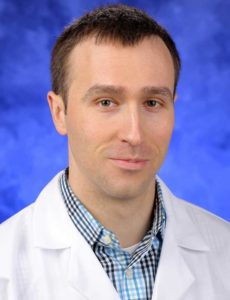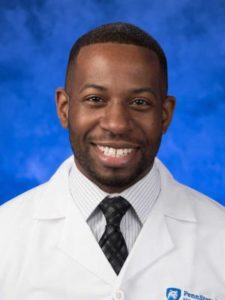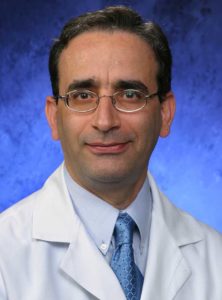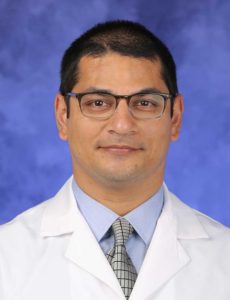Department of Medicine shares diversity news for September 2021
About the Department of Medicine Diversity, Equity and Inclusion Council
The mission of the Department of Medicine’s Diversity, Equity and Inclusion Council is to be a resource and advocate for all issues related to diversity, equity and inclusion within the Department of Medicine.
The council strives to foster an organizational change that creates, promotes and nurtures the value of a multicultural environment and varied perspective to serve Penn State Health’s missions.
It also strives to build collaborations and bridges with communities in the region as the Penn State Health family expands in central Pennsylvania.
As part of that mission, the council has created a monthly newsletter. This is the Fall 2021 edition.
Welcome
Welcome to the second edition of our Diversity, Equity and Inclusion Newsletter. Click here to read our first issue.
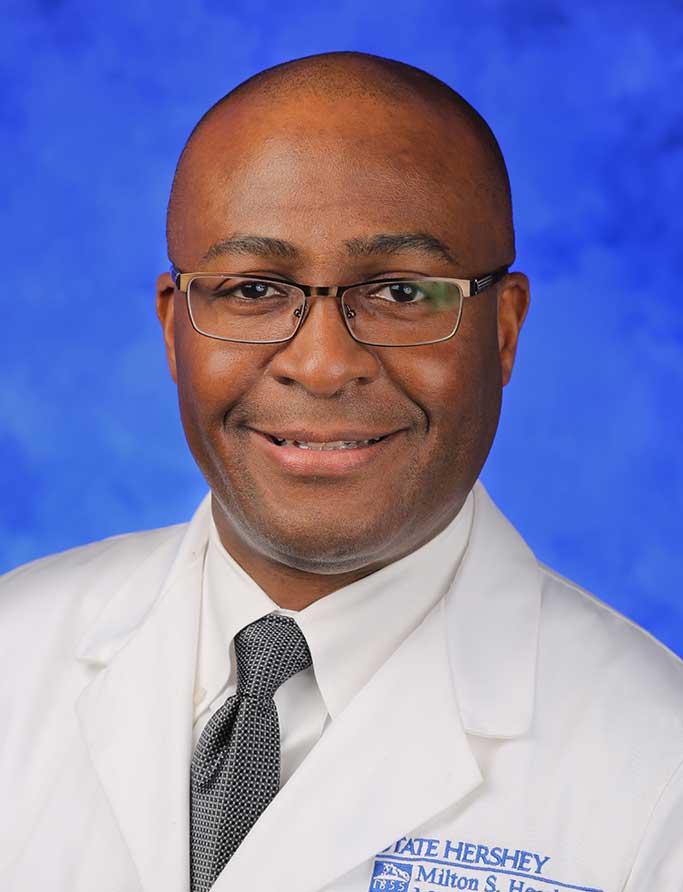
Dr. Stephen Henderson
In this issue, we will feature a touching and deeply affecting personal narrative written by Dr. Moses Mathur about the hardships his parents experienced while pushing for a better life for their children. We also spotlight some important Jewish holidays in September and highlight the observance of International Pronouns Day in October. Additionally, we explain why the terms “Eskimo” and “Indian style” should be avoided and preview several upcoming diversity-related events throughout September and October.
I would also like to highlight the section on our ongoing Diversity Grand Rounds series. I recently shared 2 case presentations examining medical conditions and health disparities in the Black community during the most recent Diversity Grand Rounds on June 15, 2021. These patient stories are very personal to me and I thank all of our attendees for their compelling thoughts and compassionate comments during this roundtable discussion. If you were unable to attend this panel or any of our previous Diversity Grand Rounds seminars, we have provided the link to rewatch the recordings below.
Thank you and please enjoy our second issue.
Stephen Henderson, MD
Chair, Department of Medicine Diversity, Equity and Inclusion Council
Department of Medicine Diversity, Equity and Inclusion Council members:
Ayesha Ahmad, MD; Glenn Buchberger, MD; Alia Chisty, MD, MS; Nasr Ghahramani, MD, MS; Fahad Khalid, MD; Karen Krok, MD; and Ify Ndukwu, MD, MBA
Jump to topic
Search
Council Member Spotlight: Why did you decide to be part of the Diversity, Equity and Inclusion Council?
Dr. Glenn Buchberger: “Until recently, my marriage was not recognized across the country I call my home; I am forever grateful to the brave people who ended that injustice. There remain, though, profound injustices that too often deny the rights of personhood to too many of my human family members. I see my work on this Council, then, as part of my duty to ending the injustice that directly threatens many and indirectly threatens us all.”
Dr. Ify Ndukwu: “I have a passion and desire to help promote and build diversity, equity, and inclusivity throughout the field of medicine. I have benefited from and witnessed the great importance diverse perspectives and life experiences have on interpersonal interactions and livelihoods. If I am able to help improve cultural environment and comradery by contributing on this council, then I am grateful to play a small part.”
Dr. Nasr Ghahramani: “I enthusiastically joined the DOM Diversity, Equity and Inclusion Council because I believe that indifference to racism, discrimination and prejudice perpetrates racism, discrimination and prejudice.
“History is marked by countless examples of discrimination, sexism, homophobia, and racism (and the mass indifference); no group has been spared. In the post-9/11 era, we witnessed the rampant discrimination and intolerance against Moslems and persons of Middle Eastern origin; not just by individuals who incited aggression, but by elected officials and the news and entertainment media. A countless number of movies and TV series was produced that portrayed the Moslem/Arab/Middle-Eastern actor (usually with a deep accent and a Moslem name) as the villain. The anti-Moslem propaganda was met with an unfortunate mass silence and lack of opposition, promoting other racist behavior and hate crimes. Fast-forward to the COVID-19 era and the same type of biased and dangerous propaganda targeted the Asian American and Pacific Islander communities, leading to discrimination, hate speech, hate crimes and tragic loss of life.
“We cannot afford to be indifferent! Making a difference and influencing culture change begins at small units (families, offices, workplaces). I joined the DOM Diversity Council with the firm belief that the Council will be a critical driver of organizational change, by addressing disparities in the workplace and influencing behavior towards inclusiveness.”
Ongoing Initiatives
As we shared in the first issue of our newsletter, we kicked off our Diversity Grand Rounds series in September 2020 with a roundtable discussion celebrating Women in Medicine, followed by a panel focused on the experiences of Hispanics/Latinx in Medicine. The most recent Diversity Grand Rounds was held on June 15, 2021, featuring Dr. Stephen Henderson, who led a compelling and important presentation on medical conditions and health disparities in the Black community.
Stay tuned for more details on the next Diversity Grand Rounds series, which will get underway on September 21, 2021, with a panel highlighting Women in Medicine. Additional discussions are planned for December 7, 2021, and March 1, 2022.
See previous Medicine Grand Rounds presentations on Mediasite
(Penn State Health ePass login required)
Presentations available on Mediasite include:
- June 15, 2021: Medical Conditions and Health Disparities in the Black Community: Case Presentations and Discussion
- March 2, 2021: Black Physicians in Medicine and COVID-19 Health Disparities in the Black Community ― Changing the Narrative
- Nov. 24, 2020: Hispanics/Latinx in Medicine: Promoting Diversity in the Workplace and Health Challenges within the Hispanic/Latinx Community
- Sept. 1, 2020: Women in Medicine: Promoting Gender Diversity in the Workplace
Another recent DOM Grand Rounds was centered around diversity as well: The Division of Hospital Medicine sponsored Grand Rounds on June 22 featuring a presentation from Dr. Henry Ng with the Cleveland Clinic Foundation, who discussed “COVID-19 and the LGBTQ+ Community: Promoting Health and Health Equity.” Click here to rewatch this session.
Stay tuned for details about upcoming health fairs and free community clinics!
Event of the Month
The Inclusion Academy is an educational program organized by Penn State Health’s Office for Diversity, Equity and Inclusion that focuses on providing cultural knowledge and an understanding with the goal of providing culturally responsive patient care to diverse and marginalized communities. The sessions are offered throughout the year and are separated into categories that benefit various audiences and are designed to foster cultural excellence in all facets of our organization.
Providing Culturally Responsive Care to Amish Patients
12 to 1 p.m. September 23
This webinar will provide participants with tools and resources to be able to provide culturally responsive health care to Amish patients and establish a caring and trusting patient-provider relationship.
Cultural Corner: Recent Holidays, Observances and Celebrations
Information submitted by Dr. Ayesha Ahmad, Co-Chair, Inter-Faith Affinity Group
In the Islamic calendar Eid al-Adha falls on the 10th day of the month of Dhul Hajj and lasts for three days. In the Gregorian calendar, the dates vary from year to year, shifting approximately 11 days earlier each year. Eid al-Adha fell on July 20 this year.
Eid al-Adha (Festival of Sacrifice) is a festival which marks the completion of Hajj (Holy pilgrimage to Mecca). The pilgrim offers the sacrifice of an animal at the end of the pilgrimage, which is also done by Muslims all over the world. This is done in remembrance of Abraham’s readiness to sacrifice his son Ismael who, in turn, resigned to being sacrificed under the belief that it was the Will of God. We read in the Holy Quran:
And when he (Ismael) was old enough to run along with him (Abraham), he said, `O my dear son, I have seen in a dream that I offer thee in sacrifice. So consider what thou thinkest of it!’ He replied, `O my father, do as thou art commanded; thou wilt find me, if Allah please steadfast in my faith.’
And when they both submitted to the Will of God, and Abraham had thrown him down on his forehead, We called to him `O Abraham thou hast indeed fulfilled the dream.’ Thus indeed do We reward those who do good.’ (37:103-105)
The Holy Quran succinctly describes the significance of animal sacrifice:
Their flesh reaches not Allah, nor does their blood, but it is your righteousness that reaches Him. (22:38)
The act of sacrifice is symbolic, reminding the person who offers it that their life is aligned to serve their creator and His creation.
Muslims celebrate by wearing fine clothes, contributing to charitable pursuits, meeting friends and family, and sharing gifts and confections that vary across cultures. The meat from the sacrificed animal is preferred to be divided into three parts. The family retains one-third of the share; another third is given to relatives, friends and neighbors; and the remaining third is given to the underprivileged.
The Jewish New Year is one of Judaism’s holiest days. Rosh Hashanah commemorates the creation of the world and marks the beginning of the Days of Awe, a 10-day period of introspection and repentance that culminates in the Yom Kippur holiday (see below). It’s observed by attending synagogue and sharing a meal steeped in symbolism and tradition, which begins with the ceremonial lighting of two candles and features foods that represent positive wishes for the new year.
Yom Kippur, also known as the Day of Atonement, is the most solemn of the Jewish religious holidays. The purpose of Yom Kippur is to effect individual and collective purification by the practice of forgiveness of the sins of others and by sincere repentance for one’s own sins. Jews typically spend the holiday fasting and reflecting on sins committed over the past year. Even if you’re not Jewish, you can acknowledge the holiday and respectfully share well wishes to those who do observe.
Unsure how to greet someone who is observing Yom Kippur? Click here for some ideas.
This international observance began in 2018 and seeks to make respecting, sharing and educating about personal pronouns commonplace. According to its website, referring to people by the pronouns they determined for themselves is basic to human dignity and being referred to by the wrong pronouns can profoundly affect transgender and gender non-conforming people.
Personal Reflection, Narratives, Short Stories and Poetry
This newsletter welcomes creative writing submissions from physicians, faculty, staff and students! Send ideas and completed works to Jessica Bogard at jbogard@pennstatehealth.psu.edu.
This piece by Dr. Mathur was written as a contribution to Inclusion Week this past January.
My parents left India in the late 1980s, and moved to the United Arab Emirates seeking opportunities beyond their homeland. They received all of their education and training in India – my father, a Radiologist and my mother, a Gynecologist. For many years they enjoyed a rewarding practice at a local town hospital in the UAE, while my younger brother and I spent our golden school years basking in the warm desert sun. Unfortunately, all of this changed after I finished high-school, when I moved away to Montreal, Canada for college. Around the same time, my parents made the difficult choice to move yet again, this time to the United States.
This decision was a monumental one for our family. It would be good for us, my parents explained. It would mean better opportunities for my brother and I, better education, better facilities, and better career options. But before we could get there, it also meant that my father would have to redo residency training in the United States, since he was a foreign medical graduate, an FMG. It meant that my mother would have to retire altogether from medicine, as she decided it would be too much for our family to bear if she too redid her residency. And worst of all, it meant that we would all have to live apart for a few years during the immigration process into the United States. Consequently, we were scattered for several years after the decision was made. While I was finishing off college in Montreal, my father was just beginning his Medicine prelim year in Long Island. Meanwhile, my mother stayed back in the UAE to wrap up our affairs and support my younger brother, who was still finishing high-school. Seemingly overnight, we found ourselves far, far away from each other, with no place to call “home”.
As most people do in times of hardship, we survived by not overthinking it. We simply pushed through one obstacle after the next. Being in my senior year of college, I was so caught up with my own challenges that I was blind to the magnitude of what my father was going through at the time. I just assumed he would be okay. After all, he was my father – smart, infallible, and invincible. During our precious weekly phone calls together, I never detected any cracks in his armor. As per usual, he always asked me about my day, if I was eating enough, and if I needed anything. He never once complained.
Today, many years later, I often wonder what it must have been like for him. I try to imagine how hard it must have been for him to show up to work that first day – a 45-year-old rotund man with an awkward haircut, outlandish mannerisms and a thick Indian accent. An experienced Radiologist for many years, now the struggling Medicine intern, stumbling through incessant pages during morning rounds, far away from anything familiar, simply trying to do his best for his wife and children. He must have stuck out like a sore thumb amongst his US born classmates, seniors, and attendings, some of them, nearly half his age. I try to imagine how he must have felt through those impossibly long nights on call, those lonely holiday weekends, and those horribly cold winter mornings, a world away from the warm desert sun of his youth. I try to imagine, knowing full well that his journey was probably a lot harder than anything I can imagine.
As I walk through the grand hallways of the hospital now, I am often reminded of him, never more so than if I cross paths with a trainee who is perhaps a little quieter, or a little different than the rest.
Other Department of Medicine Diversity Initiatives and Projects
Throughout the month of June, thousands participated in Penn State Health’s Inclusion Challenge, featuring 22 days of activities designed to help all of us learn more about advancing inclusion and how to build a culture of belonging. Recap each week’s activities here and click here to read some food for thought on the final day of the Inclusion Challenge, including a preview of next year’s event!
REMINDER: Penn State Health now has a new compliance hotline for reporting bias and microaggressions. You can report online at pennstatehealth.org/hotline or by phone at 1-800-560-1637.
What we say can have a negative and harmful impact, even if we don’t intend to send the wrong message or don’t even realize that we’re speaking insensitively. In this section, we highlight two words that should be avoided, if possible, due to troubling histories or origins.
Eskimo
“Eskimo” is a term that Europeans used to generally refer to the large group of indigenous people living in the Arctic. (According to some etymology dictionaries, the word “Eskimo” comes from the same Danish word borrowed from Algonquin, “ashkimeq,” which literally means “eaters of raw meat.”) Some linguists believe the word came from the French word “esquimaux,” referring to one who nets snowshoes. European colonizers used the term broadly, lumping all Native Americans in that region into one ethnic group; it’s actually more sensitive and accurate to instead use the proper terms for an individual’s culture, like “Inuit.”
Indian style
This descriptor of sitting in a cross-legged position is often associated with stereotypical portrayals of Native Americans and was first used in the U.S. in the early 1900s. Phrases like “cross-legged” and “criss-cross apple sauce” should be used instead.
Learn more about the history behind these and other terms with racist origins here
We will highlight Department of Medicine-specific events in the future.
Inclusion Academy Events
“Providing Culturally Responsive Care” Webinars
Providing Culturally Responsive Care to South Asian Patients
12 to 1 p.m. October 7
This webinar will provide participants with tools and resources to be able to provide culturally responsive health care to South Asian patients and establish a caring and trusting patient-provider relationship.
Providing Culturally Responsive Care to Asian American Patients
12 to 1 p.m. November 4
This webinar will provide participants with tools and resources to be able to provide culturally responsive health care to Asian American patients and establish a caring and trusting patient-provider relationship.
Cancer Disparities in the Hispanic and Latinx Communities
4 to 5 p.m. October 13
Although Hispanic populations typically experience lower cancer rates than the non-Hispanic white population, cancer remains the leading cause of death among Hispanic individuals in the United States. The National Cancer Institute reports that Hispanics and Latinos have the highest rates for cancers associated with infection.
This webinar will explore the social determinants of health and cancer disparities in Hispanic/Latinx populations and strategies for reducing such health disparities.
Improving the Experiences for Patients with Disabilities
12 to 1 p.m. October 21
Although Hispanic populations typically experience lower cancer rates than the non-Hispanic white population, cancer remains the leading cause of death among Hispanic individuals in the United States. The National Cancer Institute reports that Hispanics and Latinos have the highest rates for cancers associated with infection.
This webinar will explore the social determinants of health and cancer disparities in Hispanic/Latinx populations and strategies for reducing such health disparities.
The following events are hosted by Penn State Health’s Office for Diversity, Equity and Inclusion.
Upstander Café
12 to 1 p.m. October 1
Penn State Health’s Office for Diversity, Equity and Inclusion is hosting monthly one-hour Upstander Cafés to increase education on creating a respectful environment by providing an opportunity for employees to discuss microaggression/bias scenarios and to practice their Upstander skills, based on the scenarios.
This session will be held via Zoom, and registration is required. A Zoom link will be provided to those who register. This session will be held in person at Milton S. Hershey Medical Center, Holy Spirit Medical Center, SJMC Community Campus Walnut Medical Pavilion and Penn State Health Lime Spring Outpatient Center.
Learn more, register and choose your region here
Insight into our Identities: People with Disabilities and Inclusivity
12 to 1 p.m. October 5
The Office for Diversity, Equity and Inclusion invites you to a town hall discussion to provide a brief overview of our resources and efforts, and then engage in a dialogue on how you can be involved in our next steps towards equity and inclusion for our community of individuals with disabilities.
Global Diversity Awareness Highlighting Dashain, Durga Puja, and Navaratri Festivals
12 to 1 p.m. October 15
Join the Penn State Health Office for Diversity, Equity and Inclusion in a celebration of the Dashain, Durga Puja, and Navaratri Festivals!
Dashain is the longest and the most auspicious festival in the Bikram Sambat and Nepal Sambat annual calendars, celebrated by Nepalese people, along with their diaspora throughout the globe. Dashain symbolizes the victory of good over evil. (Wikipedia).
In the eastern and northeastern states of India, the Durga Puja is synonymous with Navaratri, wherein goddess Durga battles and emerges victorious over the buffalo demon Mahishasur to help restore dharma. In southern states, the victory of Durga or Kali is celebrated. In all cases, the common theme is the battle and victory of good over evil based on a regionally famous epic or legend such as the Devi Mahatmya. (Wikipedia).
This event is an opportunity to raise awareness about these festivals and the Hindu culture, as well as build an inclusive culture for our patients and employees with origins in these regions. We hope to see you there!
Global Diversity Awareness – Dia de los Muertos (Day of the Dead) Festival
12 to 1:30 p.m. October 27
Join the Penn State Health Office for Diversity, Equity and Inclusion in a celebration and awareness event of the upcoming Dia de los Muertos (Day of the Dead)!
Dia de los Muertos is a two-day festival that takes place every Nov. 1 and 2. Although most strongly identified with Mexico, Dia de los Muertos is celebrated throughout Latin America and everywhere with a Latinx population, including Los Angeles, California. Dia de los Muertos honors the dead with festivals and lively celebrations, a typically Latin American custom that combines indigenous Aztec ritual with Catholicism, brought to the region by Spanish conquistadores. (National Geographic).
This event is an opportunity to raise awareness about this festival and Latin American culture, as well as build an inclusive culture for our patients and employees with origins in these regions. We hope to see you there!
Previous Issues
You can read through previous issues of the Diversity, Equity and Inclusion Newsletter below:
Contact the Newsletter Team
Lead editor: Jessica Bogard (jbogard@pennstatehealth.psu.edu)
Co-editors: Dr. Karen Krok (kkrok@pennstatehealth.psu.edu) and Dr. Nasr Ghahramani (nghahramani@pennstatehealth.psu.edu)
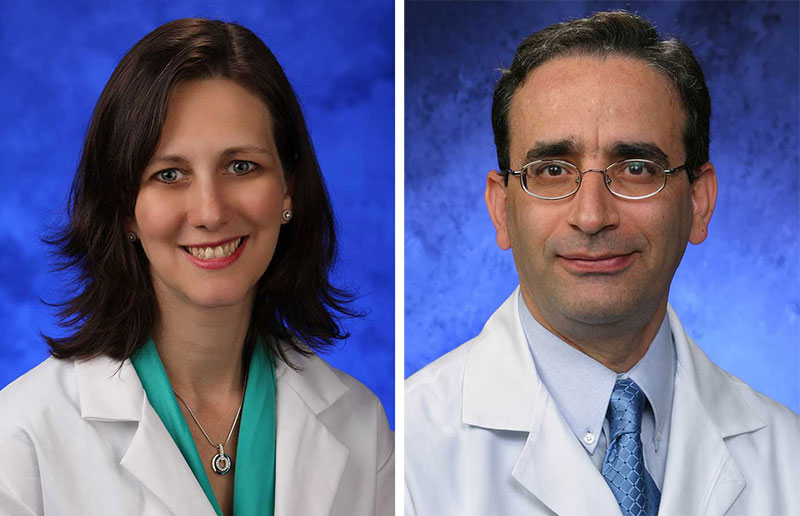
Dr. Karen Krok and Dr. Nasr Ghahramani
With questions or suggestions for this newsletter, email Jessica Bogard at jbogard@pennstatehealth.psu.edu.
If you're having trouble accessing this content, or would like it in another format, please email Penn State Health Marketing & Communications.

